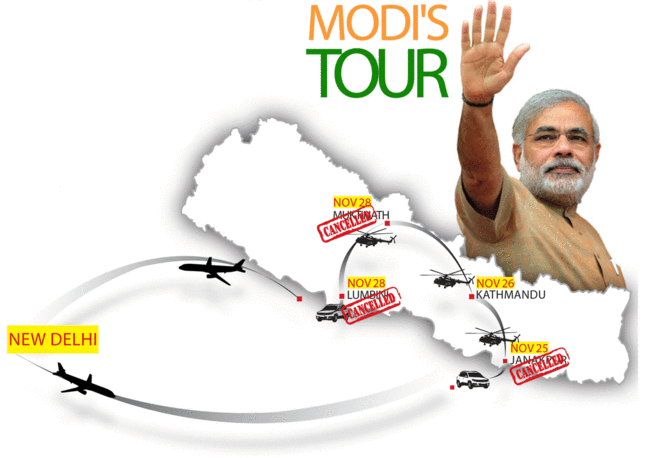The cancellation of Modi’s Janakpur visit is a reflection of how Nepal’s domestic politics has always spilled over into relations with India
JANAKPUR -- India’s Prime Minister
Narendra Modi had decided to attend the SAARC Summit in Kathmandu by symbolically crossing the border overland on 25 November from Bihar to this town in Nepal, the birthplace of Sita.
He was to be offering puja at the Janaki Temple and address the public, and this had landed the Nepal government into a bit of a quandary.
In a meeting chaired by Minister for Physical Infrastructure and Transport Bimalendra Nidhi here earlier this week, parliamentarians, the business community, representatives of non-government organisations and various associations objected to the government’s plan to confine Modi to inside the temple complex.
Most people here wanted a felicitation ceremony to take place at the nearby Barhabigha which had hosted some Indian leaders in the past, including a prime minister and two presidents.

Map: Kiran Maharjan
“If the government does not organise the felicitation at Barhabigha, then we will hold our own public reception for Modiji and request him to attend,” said Chanda Chaudhury of the Nepal-Bharat Mahila Maitri Sangh.
The anger against Kathmandu’s attempt to muzzle Modi was already unmistakable here in the capital of Mithila. “It is not about security. The Nepal government is afraid that a hugely popular Modi would
announce some development projects which they have been unable to deliver,” said Shiv Shankar Sah, chairman of Janakpur Chamber of Commerce and Industry.
In the end, Nidhi blamed the cancellation on the “extremist and intolerant” attitude shown by the UCPN(Maoist) and its allied Madhesi parties to issue threats against the visit. The government was already trying to douse increasing local pressure and the sensitivity of a foreign leader making a public address. But secretly, some in Kathmandu must be heaving a sigh of relief because they feared Modi would raise hopes of
restoring a Hindu state.
In Janakpur, priests, politicians and businessmen I spoke to this week before the cancellation were all unanimous in their support for a Hindu state.
They resented the attempt to
make Nepal secular in the new constitution, arguing that religious minorities were never discriminated against when Nepal was a Hindu state. But they were not in favour of restoring the monarchy.
The Mahant of the Janaki Temple, Ram Tapeshwar Das, was confident that the new constitution would restore the Hindu Rastra. When reminded that an overwhelming majority of the Constituent Assembly members are committed to Nepal being a secular state, he replied: “A referendum on the subject will tell us what the majority actually want.”
But isn’t it already in the Interim Constitution? “That is only a temporary measure,” came the prompt reply.
Nidhi, on the other hand, said in a statement late Thursday: ‘We and Janakpur have lost a great opportunity with the cancellation of the visit …despite all the preparation under my leadership for the visit, the UCPN(M) and Madhesi parties irresponsibly demonstrated against the preparations and issued threats.’
Nidhi had told me on Sunday that the visit would have a positive effect for Nepal’s unity and stability. He, however, could not clarify if the speech Modi would have given in Janakpur would first be vetted by the government.
Modi may not have wanted to upset his phenomenal popularity in Nepal where the Gujarat riots and his role in it are rarely mentioned. Most Nepalis are
impressed by his charisma and ‘development model’. The opposition in Janakpur may have become just too hot to handle.
In his
well-received address to the Nepal parliament in August followed by his
Republic Day address from the ramparts of the Red Fort, and then in his speech at the UN General Assembly in September, he cited Nepal as a role model for conflict resolution. That has not gone unnoticed in Nepal.
And neither has it in India. So the current powers that be in India would be wary of sacrificing the new-found goodwill for Modi, and by its extension, to India.
Modi and his close advisers are reportedly miffed at the way India’s
Research and Analysis Wing (RAW) mishandled Nepal policy during the Maoist insurgency. They blame the spy agency for contributing to
anti-India sentiment in Nepal. Besides, the new Indian establishment sees the election result of November 2013 in Nepal as a confirmation of its stance.
Would Modi want to embarrass the Nepal government and many in Nepal who do not identify themselves as Hindus by playing to the domestic gallery? By cancelling the Janakpur visit, Modi has shown he is going to play it safe.
@damakant
Read also:
SAARC’S raison d’être, Editorial
Pride and prejudice at SAARC, Kanak Mani Dixit
Reimagining South Asia, Anurag Acharya
SAARC Timeline, Ayesha Shakya
The second coming, Editorial
Great expectations, Anurag Acharya
Separation of state and temple, Editorial
Modifiable relations, Damakant Jayshi
Modi-fying Indo-Nepal ties, Damakant Jayshi